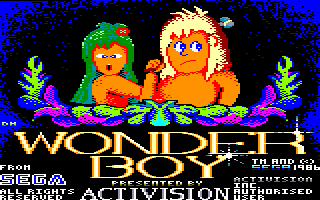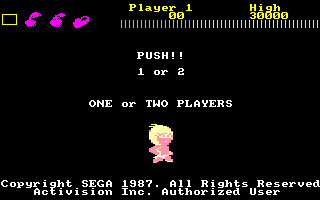Wonder Boy for Amstrad CPC
Amstrad CPCGame controls in browser
Show Controller & SystemClick on play Amstrad CPC game now button first to start emulator and load the game. Controls:
Wonder Boy
Online version of Wonder Boy for Amstrad CPC. Wonder Boy (Wandā Bōi) is a 1986 platform game published by Sega and developed by Escape (now known as Westone Bit Entertainment). Originally designed for arcades, it was later ported to the SG-1000, Master System and Game Gear consoles by Sega, and to the ZX Spectrum, Commodore 64 and Amstrad CPC home computers by Activision. The titular Wonder Boy is a tribal caveman-like boy whose girlfriend Tina has been captured by the dark King. The player must guide the Wonder Boy through seven areas, each consisting of four rounds. The boy can arm himself with a stone hatchet, which he can throw at oncoming foes, a skateboard with which he can rush through the levels and temporary protection by an angel which allows him to destroy foes by simply running into them...
Game details
Other platforms online 4
You can play Wonder Boy online also in a versions for0%
rating (0 users voted)
Amstrad CPC Computers
Online emulated version of Wonder Boy was originally developed for the Amstrad CPC (Colour Personal Computer), a series of 8-bit home computers produced by Amstrad between 1984 and 1990. It was designed to compete in the mid-1980s home computer market dominated by the Commodore 64 and the Sinclair ZX Spectrum in Europe. The series spawned a total of six distinct models: The CPC464, CPC664, and CPC6128 were highly successful competitors in the European home computer market. The later 464plus and 6128plus, intended to prolong the system's lifecycle with hardware updates, were considerably less successful, as was the attempt to repackage the plus hardware into a game console as the GX4000.
The CPC models' hardware is based on the Zilog Z80A CPU, complemented with either 64 or 128 KB of RAM. Their computer-in-a-keyboard design prominently features
an integrated storage device, either a compact cassette deck or 3 inch floppy disk drive. The main units were only sold bundled with either a colour,
green-screen or monochrome monitor that doubles as the main unit's power supply. Three built-in display resolutions are available:
160×200 pixels with 16 colours, 320×200 pixels with 4 colours, and 640×200 pixels with 2 colours.
The CPC uses the General Instrument AY-3-8912 sound chip, providing three channels, each configurable to generate square waves, white noise or both.
Additionally, a wide range of first and third-party hardware extensions such as external disk drives, printers, and memory extensions, was available.



